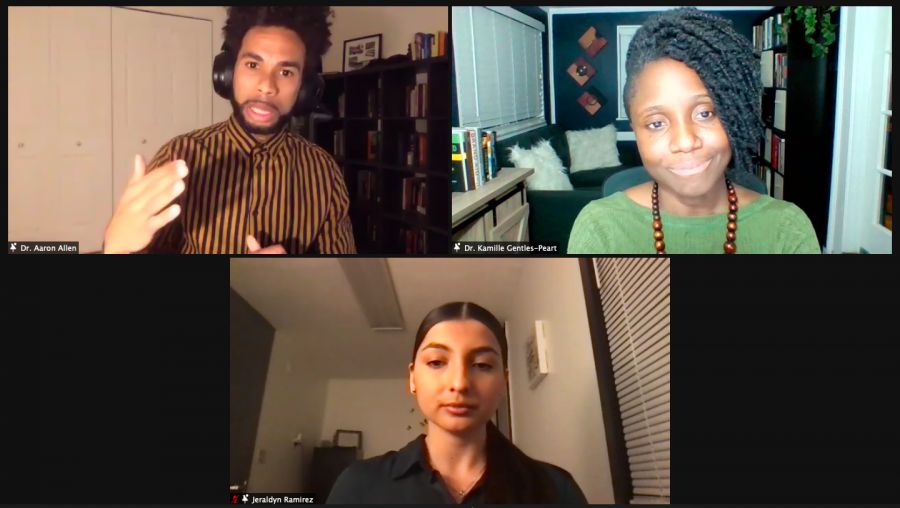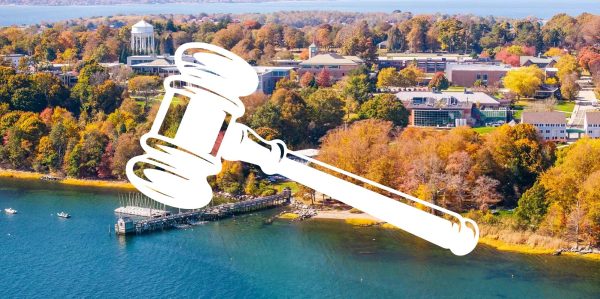‘Transformation rarely happens with people smiling’
MSU, BLSA and the Intercultural Center lead the conversation on race, racism and the law
Caption: Dr. Aaron Allen and Dr. Kamille Gentles-Peart answered questions regarding police brutality, white supremacy and defunding the police.
“Justice for George Floyd isn’t our ability to be witness and in some cases, lawyers to his murder. Justice is George Floyd being alive and living with dignity,” said Assistant Professor of Cultural Studies Dr. Aaron Allen in last night’s panel event.
Allen served as a panelist during “Conversations on Race, Racism and the Law: Unpacking ‘Defunding the Police’ and White Supremacy,” an event put on by the Multicultural Student Union (MSU), the Intercultural Center and the Black Law Student Association (BLSA).
Allen was joined by Associate Professor of Communication and Media Studies Dr. Kamille Gentles-Peart. Both panelists led the conversation after receiving questions from MSU president Jeraldyn Ramirez and Matthew Chatelain, President of BLSA.
Chatelain began the conversation by asking the panelists how they would define police brutality. Allen and Gentles-Peart agreed that police brutality goes beyond violence against the body and that it produces trauma in different ways. Allen described it as state-sanctioned violence that is used in order to control bodies and their movement.
“It is the traumatic recurrent abuse of the human rights of Black, Brown and Indigenous people,” Gentles-Peart said. “The policing of Black and Brown communities is very much about containment. As Dr. Allen said, it’s about maintaining a certain kind of order.”
When asked if violence against Black and Brown people has gotten better, both panelists agreed there has been change but it is not necessarily better for these communities. Laws have been put in place to restrict police officers from excessive use of force but Gentles-Peart pointed out that it is up to each individual police officer to follow the new rules.
Allen brought up the talk, the conversation that takes place in Black and Brown families which consists of parents warning their young children of the dangers they may face due to racism. He explained that the talks are full of empty promises and he understands that but he still plans to have the talk with his own children.
When asked how BIPOC can protect themselves against police brutality, Gentles-Peart was unable to give one specific answer. She described how it is on a moment-by-moment basis and that the threat of violence changes between borders, neighborhoods and even stores.
Ramirez began asking questions to the panelists starting with what defunding the police really means. Both panelists agreed there are multiple definitions and that it changes for each person. Some people want to reallocate funding that goes into weaponizing the police while others want to abolish the police as a whole.
Toward the end of the conversation, the panelists took questions from the audience. Vice President of Student Life Dr. John King asked how the university can approach the conversation with students in the criminal justice program who may be hesitant to have the conversation.
Allen described how radical change means to fully engage in the conversation of defunding the police. Gentles-Peart discussed how systemic change starts with the individuals in the system. She also discussed how she creates a culture while teaching that does not allow for future police officers to sit back from the conversation or become part of the problem.
This conversation was part of MSU’s Stay Woke Week, an annual event series put on by the organization. The event series started on April 5 with a table time dedicated to Anti-Asian Hate Crime Awareness. The rest of the event series consists of a Mental Health Event on Wednesday and COVID Support Clothing Drive on Thursday, ending with Cultural Appropriation vs. Cultural Appreciation on Friday. More details can be found on MSU’s Hawk Link page and Instagram, @msurwu.
Emily Dvareckas graduated from RWU in 2022 with a degree in forensic science. She spent three years with The Hawks’ Herald as the photo editor...






